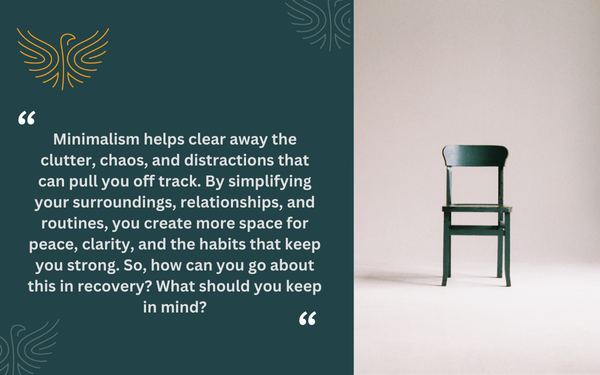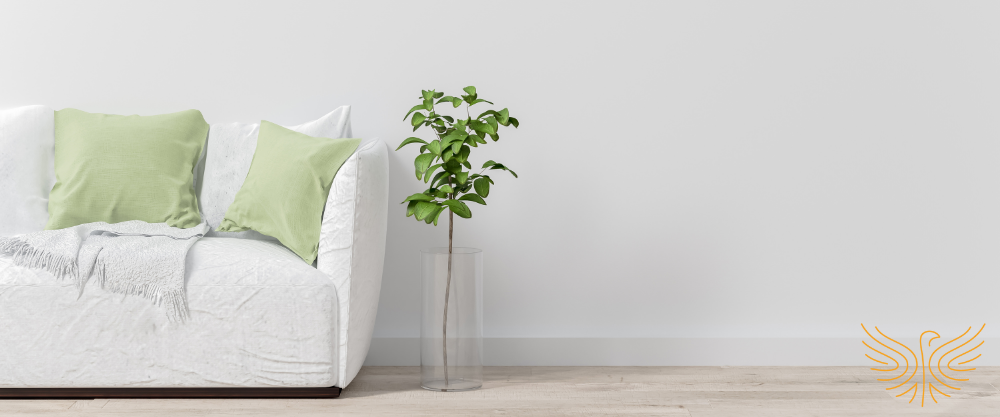In recovery, our choices can make or break us. For instance, the choice to use is one that you may be faced with on a daily basis. While rehab offers tools to overcome temptations, cravings, and cope better, simple lifestyle choices—like embracing minimalism—can also support your sobriety and new chapter.
Minimalism helps clear away the clutter, chaos, and distractions that can pull you off track. By simplifying your surroundings, relationships, and routines, you create more space for peace, clarity, and the habits that keep you strong. So, how can you go about this in recovery? What should you keep in mind?

_______________________________________________________
What Does Minimalism Mean in Recovery?
When you think of minimalism, you may automatically picture nearly empty rooms, bare walls, and giving away almost everything you own. But minimalism doesn’t have to be so extreme.
In recovery, minimalism means being intentional about what you allow into your life—physically, mentally, and emotionally. It’s about asking yourself: Does this help me heal, or does it hold me back? This mindset shifts the focus from accumulating more to valuing what truly matters, such as your health, your relationships, and your peace of mind.
Minimalism in recovery can look like:
- Letting go of possessions or relationships that remind you of past substance use.
- Choosing activities that strengthen your sobriety instead of draining your energy.
- Surrounding yourself with people who uplift and support you.
By removing the unnecessary, you free up time, energy, and mental space to invest in the habits and connections that help you thrive and, ultimately, support your sobriety. In many ways, you can actually think about it as a way to make room for more positive and uplifting energy that contributes to your current and future goals.
_______________________________________________________
How to Lead a Minimalist Lifestyle in Recovery
Minimalism can easily become a daily habit and way of life. In turn, it can reduce the weight, emotionally, physically, and spiritually, that you may have been carrying prior to the start of your recovery journey. So, how can you get started?
Step 1: Declutter Your Space
Starting with your physical environment can make things more tangible. And the truth is that your environment can either trigger stress and cravings or promote peace and sobriety.
So, start small—clear a drawer, a shelf, or one corner of a room. Let go of items tied to your past substance use or that carry negative memories. As your space becomes cleaner and more intentional, you’ll notice it’s easier to feel calm and stay focused on your recovery.
Step 2: Create a Simple Schedule
Routine is undeniably important in recovery. Yet, overcommitting can drain your energy and increase stress, which may raise the risk of relapse.
Take an honest look at your calendar. Which activities truly support your healing? Which can you say “no” to? By keeping your schedule lighter, you create room for rest, self-care, and quality connections.
Step 3: Decrease Your Mental Clutter
Sobriety requires mental clarity. Practices, such as journaling, mindfulness meditation, or setting digital boundaries (limiting news and social media), can help quiet the mental noise. Consider adding a few simple and basic practices to your existing schedule. When staying sober, your mental health is just as important as your physical health.
When it comes down to it, a clearer mind makes it easier to focus on healthy coping strategies and long-term goals.
Step 4: Consider Your Relationships
Yes, social connections are important. A healthy social network can support your recovery in many different ways. It’s also essential for good mental health. But not everyone you knew before rehab may fit into your life post-rehab.
Instead of pouring energy into relationships that don’t serve you, focus on nurturing connections with people who support your sobriety and personal growth. And seriously consider distancing yourself from relationships that bring drama, stress, or temptation.
Step 5: Express Gratitude for What’s Kept
Minimalism can propel your gratitude for life and any pieces in it that much farther. For instance, each time you choose to keep something, ask yourself why it matters. What’s important about it? How does it bring you joy?
This habit shifts your focus from what’s gone to what truly enriches your life, strengthening your sense of contentment and stability.
_______________________________________________________
Recovery is a Journey, Not a Destination
With each choice, you shape the life you’re creating. And the less energy you spend on things that don’t matter, the more you can invest in the life you want to live.
Start small. Clear one drawer. Say no to one commitment that drains you. Spend time with someone who makes you feel supported. Each step toward simplicity is a step toward strength.
You’ve worked hard to get where you are. Protect your progress by choosing what truly matters—and let everything else go.
And if you’re still in the initial stages of recovery or thinking about getting help, our team at Freedom Recovery Centers (FRC) is here when you’re ready. Call us at 804-635-3746; we answer our phones 24/7 and can guide you through every step toward a more healthy and vibrant life!
.svg)






.svg)

.svg)



.svg)
